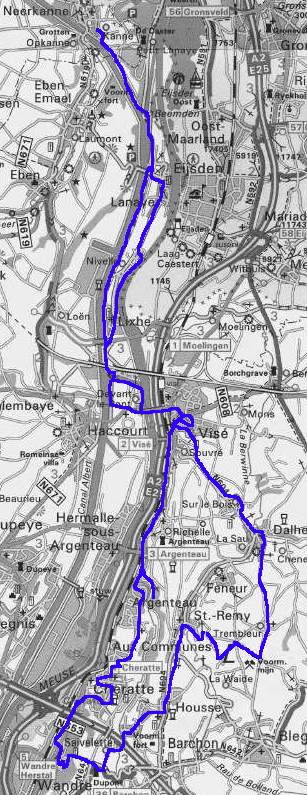Twee (of is het al drie?) dagen geleden tikte ik een stukje over de Verdonk/Ali-kwestie. Uiteindelijk klikte ik niet op ‘Publish’. Genoeg anderen die er iets over zeggen, en bovendien, ik had maar een uurtje Nova gezien (en dan nog alleen maar bij toeval, omdat de videorecorder het ‘s middags had laten afweten en ik dus geen tape met de Giro-etappe te bekijken had). En ook, hoe interessant is het eigenlijk? (Best interessant: in verband met legaliteit en legitimiteit… en dat soort zaken).
Verdonk noch Hirsi Ali kunnen op mijn sympathie rekenen. Verdonk is een minister die, eng, regeltjes voor alles laat gelden, daar de uiterste consequentie uit trekt, er niet voor terugschrikt naar een Centraal Afrikaans land te vliegen om daar vluchtelingen persoonlijk te vertellen dat ze beter daar blijven aangezien ze niet welkom zijn in Nederland. Noem het consequent, noem het dapper, noem het hypocriet, of noem het (bijna) neo-fascistisch, of noem haar een hutspot-Thatcher. Wat u wilt. Hirsi Ali’s ideeën bevallen me evenmin, en wat ik van haar gelezen heb, vond ik niet erg doordacht. Een politica is ze zeker niet, wel een luis in de pels. En er moeten ook enge luizen in de pels zijn. (Om te bestrijden).
(Maar goed, ik kan me vergissen. Paul Scheffer’s opinies doen me ook nooit wat, en die man kan toch over het algemeen op veel waardering rekenen).
Anyway: mn vader heeft weer ‘ns gelijk gekregen, toen de VVD Hirsi Ali op de lijst zette, in de hoop om zo stemmen te cashen, zei hij: “dat zal ze nog bezuren, daar komt ellende van voor de VVD”. (Ali immers ging over naar de VVD nadat haar gebleken was dat ze binnen de PvdA geen carriere kon maken — tja, waarom… ze wisten binnen de PvdA waarschijnlijk al beter &c.).
Als ik de stand van zaken goed begrijp, heeft Verdonk 1 fout gemaakt. Zij had nooit minister mogen worden, niet volgens haar eigen ijzeren regels. (Natuurlijk wist ze dat Ali gelogen had over haar naam — zoals nu blijkt is dat altijd onder politici een ‘publiek’ geheim geweest). Of ze had moeten zeggen: als ik minister wordt, vliegt zij eruit. Ah well. Nu is t allemaal terugkrabbelen, heroverwegen. Nu gaat Verdonk door de knieen (of hoe zeg je dat). Wat een aanfluiting. We zitten al met een minister-president die niet serieus te nemen valt, en dan blijkt ook Verdonk zichzelf tot schertsfiguur te kronen?
Wel, hier mijn 2 centen en 2 (of 3?) dagen geleden:
Wat een treurige vertoning
Maar ook ironisch. De VVD omarmde Hirsi Ali. Hirsi Ali is niet iemand die je in je partij wilt als volksvertegenwoordiger (ik zou het niet willen). Je wilt haar in de denktank, al luis in de pels, als aanjager, niet in het parlement. Kwestie van persoonlijkheid. Het moest wel misgaan. De VVD zal het bezuren, dat ze Hirsi Ali binnenhalen (zoiets zei mijn vader destijds).
Hoe het misgaat, oh hoe ironisch. Hirsi Ali verdwijnt uit de VVD. Ze wordt uit het parlement gezet. Haar Nederlanderschap wordt haar ontnomen. Ze gaat naar de VS. (Ze ging sowieso al naar de VS). Terwijl ze gaat onthult ze de zwartste kant van Verdonk, of haar ware gezicht: regels voor alles. Hard maar rechtvaardig (lees: bijna fascistisch). Ook als de regels zich tegen je eigen vrienden keren. Kadaverdiscipline.
Zo goed als iedereen keert zich tegen Verdonk. (Gelukkig, denk je dan). Ook haar eigen partij. Verdonks verweer is eng en zwak. Straks zijn we zowel Hirsi Ali als Verdonk kwijt, ze hebben elkaar ‘afgemaakt’. Dat noem ik (ik ben het over het algemeen grondig oneens met zowel Verdonk als Hirsi Ali), ironisch.
Dat tikte ik dus eerder.
Goed, Hirsi Ali had zichzelf toch al weggepromoveerd naar een conservatieve Amerikaanse denktank waarvan de mission statement als volgt leest: “AEI’s purposes are to defend the principles and improve the institutions of American freedom and democratic capitalism–limited government, private enterprise, individual liberty and responsibility, vigilant and effective defense and foreign policies, political accountability, and open debate.” Of zoals we elders vinden: “The American Enterprise Institute for Public Policy Research (AEI) is an extremely influential, pro-business right-wing think tank founded in 1943 by Lewis H. Brown. It promotes the advancement of free enterprise capitalism, and succeeds in placing its people in influential governmental positions. It is the center base for many neo-conservatives.” Denk ervan wat u wilt.
Verdonk beschadigd, Hirsi Ali een trapje hoger op de ladder naar de macht.
Btw: good stuff in deze comment-tread op de blog van Jeroen Mettes: http://www.blogger.com/comment &c.

